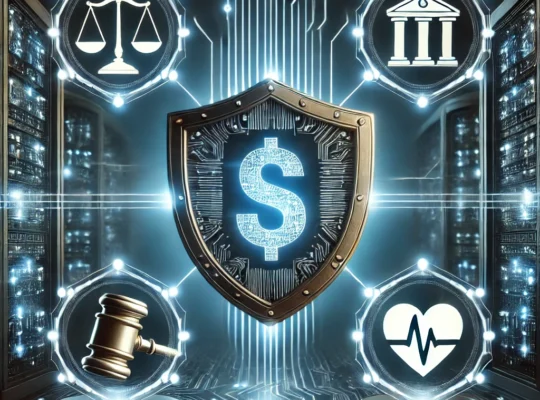Introduction
Today, people share a lot of personal details online—especially on apps like Facebook, Instagram, and TikTok. But have you ever wondered who can see that information? Or how it’s protected?
This article looks at a U.S. law called the CLOUD Act and how it affects your privacy when using the internet and cloud services. We’ll also talk about why cloud computing is important for businesses and how it connects to your data.
A Look at Online Privacy Problems
Before the internet was common, people didn’t post much personal information for others to see. But now, websites and social media apps collect tons of details about us—like our names, where we live, and what we shop for. These platforms store that information in the cloud—which just means powerful computers somewhere else store it for you.
But there’s a big problem: those systems aren’t always secure.
What Can Go Wrong?
- Hackers can break in and steal your info.
- Companies might sell or misuse your data without asking.
- Big data leaks have happened—like the Facebook data breach in 2018.
This makes it important to:
- Be careful with what you share online.
- Use strong passwords.
- Adjust your privacy settings on websites and apps.
What Was It Like Before the CLOUD Act?
Before the CLOUD Act existed, the rules about cloud data were unclear. The U.S. had an old law called the Stored Communications Act (SCA). But that law was made way before cloud computing became a big deal.
So if police in the U.S. wanted data stored in another country—like emails or photos—they faced a lot of legal roadblocks.
An Example: The Microsoft Ireland Case
In 2013, the FBI wanted to see emails that were stored on Microsoft’s servers—in Ireland. Microsoft said no because the data wasn’t in the U.S. This case showed that older laws didn’t work for cloud data.
What Is the CLOUD Act?
To fix these problems, the U.S. government passed the CLOUD Act in 2018.
The full name is: Clarifying Lawful Overseas Use of Data Act.
This law made new rules for how law enforcement can request cloud data, even if it’s stored in another country. It also lets other countries that have an agreement with the U.S. ask for data from U.S.-based tech companies.
Main Points of the CLOUD Act:
- Police in the U.S. can ask for data stored overseas if it’s held by a U.S. company.
- Other countries can also ask U.S. companies for data—if they have a data-sharing deal.
- It updates old laws to better fit the way we use the internet today.
Why the CLOUD Act Matters
The CLOUD Act affects how countries work together to get data from tech companies. If two countries sign a special agreement, they can request information from each other’s cloud services without going through a long legal process.
This is helpful because:
- It allows law enforcement to solve crimes faster.
- It creates clear rules for companies to follow.
But it also makes people wonder: Is my data safe?
Concerns About Privacy
While the CLOUD Act helps police do their jobs, many people worry it gives governments too much power. Some believe the law could be used to spy on people or ignore other countries’ privacy rules.
What People Are Worried About:
- Too much access: The U.S. could reach into other countries’ data too easily.
- Privacy law conflicts: It might clash with laws like Europe’s GDPR, which strongly protects people’s data.
- Lack of rules: Some say there’s not enough oversight to make sure the law isn’t abused.
- Weaker privacy rights: Groups like the ACLU say the law may hurt people’s rights.
This has led to a lot of debate over how to balance safety with privacy.
How the CLOUD Act Affects Businesses
The CLOUD Act is very important for businesses, especially companies that use or provide cloud storage, like Google Cloud or Amazon Web Services.
Here’s how it works for them:
- If the government asks for data, businesses have to figure out how to follow the law—without breaking other countries’ rules.
- That means setting up strong data security plans.
- They also have to train their workers to handle data safely.
Example:
A company like Core Technologies Services, Inc., which helps other businesses with cloud solutions, must:
- Follow the CLOUD Act,
- Keep their clients’ data safe,
- And make sure they are not breaking privacy laws in other countries.
Comparing the CLOUD Act to GDPR
Let’s compare the CLOUD Act and GDPR to see how they’re different.
FeatureCLOUD Act (USA)GDPR (Europe)GoalHelp law enforcement access data protect people’s data Who Uses It? U.S. government and policeAll companies handling EU citizen data access RulesAllows cross-border access with agreements requires user consent and strong protections.
FocusSolving crimes and national security privacy rights and data safety Potential ConflictsMay go against local laws in other countries to limit foreign access to EU-stored data.
As you can see, GDPR focuses on protecting people, while the CLOUD Act helps police get access to data—even if it’s stored abroad. This can create conflicts, especially when both laws apply to the same data.
The Idea of Data Sovereignty
Another big topic is data sovereignty. This means that countries want to control any data stored within their borders.
The CLOUD Act can make this tricky because one country’s law might say the data must stay put—while another says it must be shared.
This has led to:
- Confusion for global companies,
- More countries making their own data rules,
- And tougher decisions for tech companies on who to follow.
Tips for Better Privacy
To protect data in today’s digital world, both businesses and everyday users need to be careful.
Here are some good practices:
- Use strong passwords that are hard to guess.
- Encrypt your data—this means turning it into a code that’s hard to read.
- Review privacy settings on all your apps and devices.
- Train employees to protect customer information.
- Be careful when using third-party services—they must follow privacy laws too.
Final Thoughts
The CLOUD Act is a major law that changes how governments can access cloud-stored data. It’s useful for helping law enforcement but also raises serious concerns about personal privacy.
As technology keeps growing, we’ll need smarter rules that:
- Protect people’s data,
- Help police fight crime,
- And keep international laws in balance.
What Can You Do?
- Stay informed about how your data is used.
- Use good privacy tools and habits.
- Support laws and companies that care about data protection.
In the end, finding the right balance between security and freedom will shape the future of privacy. Companies like Core Technologies Services, Inc. will play a big role in helping other businesses deal with these challenges the right way.
Ready to elevate your business with cutting-edge IT solutions? At Core IT, we specialize in providing end-to-end IT services, including network infrastructure, cloud computing, cybersecurity, managed services, and IT consulting tailored to your business needs. Whether you’re a startup or an enterprise, our expert team ensures your technology drives growth, efficiency, and security. Let’s transform your IT – get in touch with Core IT today and power your future with smarter solutions!
📌 440 Cobia Dr, Unit 1101,Katy, TX 77494 USA
📞 +1.888.851.5253
📧 info@coreitx.com















